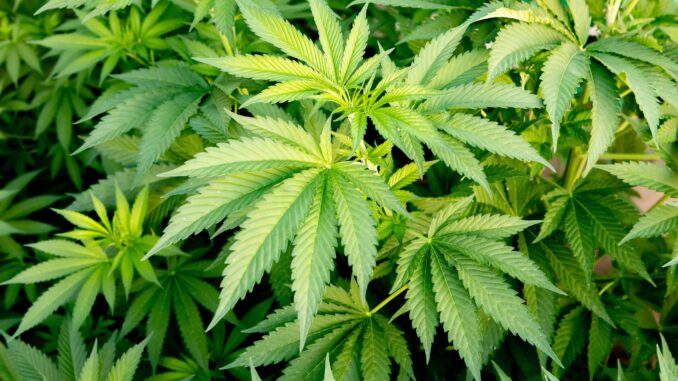
[ad_1]
An Iowa legislative panel this week approved a bill that sets limits on consumable hemp products sold in the state. The measure, House Study Bill 665, was approved on Wednesday by the House Public Safety Subcommittee by a vote of 2-0.
The bill, which was submitted to the state legislature by the Iowa Department of Public Safety (DPS), gives the state Department of Health and Human Services (HHS) the authority to regulate consumable hemp products. Under the measure, HHS can set cannabinoid potency limits on hemp products and set rules for their distribution and sale. The legislation also limits sales of consumable hemp products to adults aged 21 and older and sets criminal penalties for those who sell or give such products to minors.
Hemp products were legalized federally by the 2018 Farm Bill, followed by the legalization of the crop in 2019 by the Iowa Hemp Act. But neither law sets quality standards for consumable hemp products or includes provisions to regulate their production, distribution and sale.
The lack of regulation has led to a nationwide proliferation of hemp-derived products with intoxicating cannabinoids including Delta 8 and Delta 9 THC, among others. In Iowa, state lawmakers say they thought that such products were prohibited by the Farm Bill and the Iowa Hemp Act.
“We thought we were dealing with the intoxicating aspect, only to find out that there are ways to get around that,” Rep. Steve Holt told The Gazette. “So it’s sort of the wild, wild west out there in a lot of ways, with THC-infused drinks being able to be served to minors, a lot of other things going on that are not acceptable.”
Josie Wagler, the Department of Public Safety’s legislative liaison, said that the wide availability of intoxicating hemp products in Iowa made it necessary for the department to develop a regulatory proposal.
“We’ve seen an emergence of high potency, high-THC products hit the market,” Wagler said. “And coupled with that, there are no age restrictions for purchasing these products. So really the purpose is to get at that, and to give HHS and law enforcement some additional tools to help regulate these highly intoxicating products.”
The bill is supported by mental health advocates including Leslie Carpenter, the co-founder of Iowa Mental Health Advocacy, who told lawmakers that high-potency THC products pose the risk of serious mental consequences such as psychosis, especially when they are used by young people.
“I fully support medical marijuana,” Carpenter said during a House subcommittee hearing on Wednesday, according to a report from Radio Iowa. “It’s the high potency THC products and that currently a child can walk into a store and purchase them that makes me very concerned.”
Business Owners Oppose Legislation
Business owners in Iowa’s hemp industry oppose House Study Bill 665, saying the legislation goes too far. Scott Booher, the operator of Four Winds Farms, said that his business grows hemp for CBD and CBG, a cannabinoid that many people use to help with chronic pain, anxiety and sleep. He said he has many customers who buy these products for their children, but the bill advanced on Wednesday would make such use a criminal offense.
“Let’s look at what needs to be taken care of instead of just sweeping everybody under the rug,” Booher told lawmakers at the hearing. “We have patients that are kids, we have parents that buy our hemp products for their children. For ADD, for behavioral problems.”
Licensed hemp grower Tyson Allchin called out legislators for changing the standards regulating hemp and medical marijuana production. He believes he is the first Iowa grower to produce a hemp product that meets the standards for human consumption.
“My flower was packaged and labeled as a food-grade ingredient, lessons on infusion and extraction for personal use had been planned out and promoted, and HHS approved it on January 31,” Allchin told Iowa Capitol Dispatch.
“And six days later, this bill attempts to ban it. I’ve exceeded state requirements, requirements which exceed federal guidelines,” Allchin added. “I’ve done everything required of me, and the state (is) continuously changing my goal. How can small farms ever get established when the state keeps moving our goal line?”
Booher said that he agrees that some hemp producers are selling intoxicating products that are not in line with the spirit of hemp legalization laws. But the bill advanced by lawmakers on Wednesday conflates businesses like his that produce non-psychoactive products with bad actors in the industry.
“Some of these people who are creating high THC products need to be held accountable in a different way,” Booher said, “maybe not with people who have low THC products.”
Representative Phil Thompson said he appreciates that many people are “willing to admit there are bad actors” and that he understands the frustration of business owners who are following the rules in place.
“But this is an important conversation to advance,” Thompson said. “I appreciate DPS on working on this and bring forth some guidelines on regulating this.”
The legislation has now been referred to the full House Committee on Public Safety for further consideration.
[ad_2]
Source link

Soyez le premier à commenter